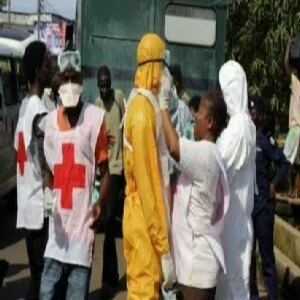Authorities in Sierra Leone quarantined three doctors and 28 nurses in the capital Freetown when a mother tested positive for Ebola after giving birth, the health ministry said Thursday. Doctors were unable to stem the woman’s bleeding and she was transferred to an emergency ward at the Princess Christian Maternity Hospital, where she tested positive for the deadly virus Saturday. “All the health workers as well as the baby are now quarantined … and will be there for observation for 21 days,” ministry spokesman Jonathan Abass Kamara said.
Kamara told AFP none of those in quarantine had shown any symptoms of Ebola, which fells its victims with high fevers, vomiting, diarrhoea and – in the worst cases – unstoppable internal and external bleeding. The National Ebola Response Centre (NERC) said the woman was one of three new cases registered over the past week in the densely-populated coastal slum of Magazine Wharf, the first infections for weeks in Freetown.
Part of the slum was placed in quarantine as the cases began to emerge but the heavily-pregnant woman escaped and headed to the nearby Mabaila Health Centre to give birth, according to the health ministry. Health officials say the mother and the other two cases are still alive, although further details on their condition were not immediately available. The worst outbreak of Ebola in history has seen 27,443 infections in Guinea, Liberia and Sierra Leone, of which 11,207 have been fatal, according to official data largely deemed to be an underestimate.
The number of health workers infected stands at 872, of whom 507 have died, since the epidemic broke out in southern Guinea in December 2013. Sierra Leone has seen almost half of the total caseload, reporting more than 3,900 deaths, but had hoped to follow the example of neighboring Liberia, which was declared Ebola-free in May. The World Health Organization (WHO) said in its latest update on the epidemic Wednesday however that weekly case incidence had stalled at between 20 and 27 in Guinea and Sierra Leone since the end of May.
New cases were continuing to “arise from unknown sources of infection, and to be detected only after post-mortem testing of community deaths,” the WHO said, a key indication that the outbreak is not under control. Authorities have blamed the failure of Sierra Leone and Guinea to eradicate the virus on people hiding deaths in the family and carrying out unsafe burials that are aiding Ebola’s spread.









No Comments